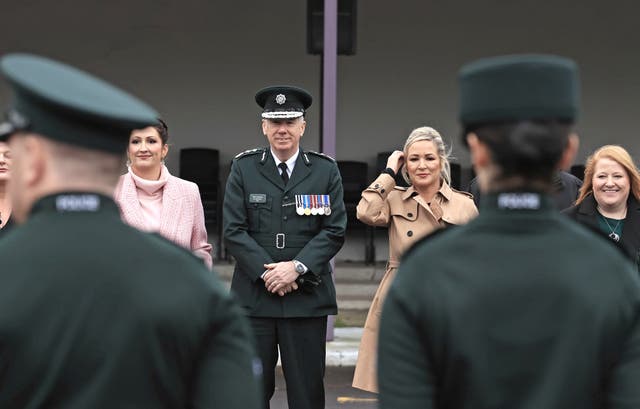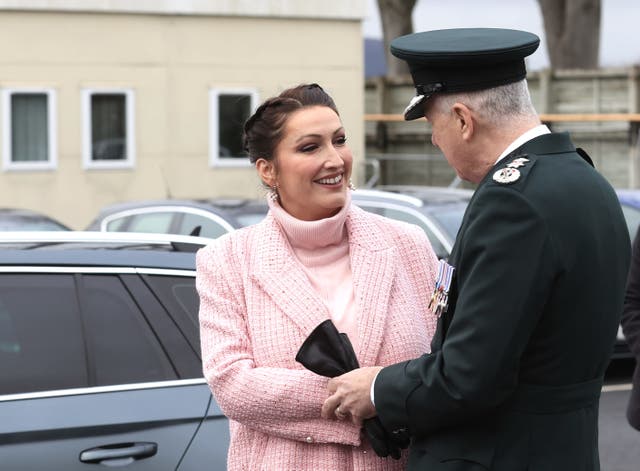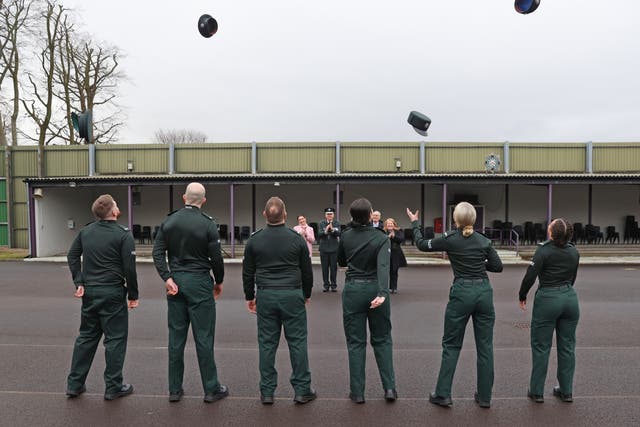O’Neill hopes attendance at PSNI graduation encourages more nationalists to join
The First Minister said it was the “right juncture” for Sinn Fein to attend its first attestation ceremony at the police college in Belfast.

Stormont First Minister Michelle O’Neill has expressed the hope that her attendance at a PSNI graduation ceremony will encourage more nationalists to join the police in Northern Ireland.
Ms O’Neill said she believed it was the “right juncture” in the region’s “policing journey” for Sinn Fein to be represented at an attestation event for new recruits for the first time.
The Sinn Fein vice president became Northern Ireland’s first ever nationalist first minister last weekend when powersharing returned to Northern Ireland.
DUP deputy First Minister Emma Little Pengelly and Alliance Party Justice Minister Naomi Long were also among guests to watch on as six new recruits formally graduated as constables.
The presence of leading Sinn Fein figures comes amid police concerns at stalling efforts to boost Catholic representation in the PSNI, 23 years after its formation as part of peace process policing reforms.
The targeting of Catholic officers by violent dissident republicans has been cited as a key factor in falling numbers of applications from members of the nationalist community.

“It’s a great day for the six graduates who have now been attested this afternoon and I wish them the very best for their future career in policing,” she said.
“I think it’s so important that our policing service reflects the diversity of our society that we have, so I wanted to be here and be part of wishing these new constables the very best in their journey.
“I became First Minister last Saturday. I said I would be a first minister for all and that includes these new constables who have graduated today.”
She added: “We’re all on a journey. And I think the fact that where we are now in terms of the policing journey, it’s the right juncture in which to be here and to be part of what is a special day for those new constables.”

She also reflected on changes in policing across the last quarter of a century.
“I think we are in a much, much better place – we look at the last 26 years of the Good Friday Agreement and how society has transformed,” she said.
“That is also relevant to the policing community here too. So I think that our policing service needs to reflect the diversity of society so I think there is a lot more to be done in terms of trying encouraging others to come forward.
“I hope my presence here today encourages young nationalists to come forward, but also women and people from minority backgrounds and members of the LGBTQ community – they need to be reflected in the service because this is a community service to support people out there.
“So I think the more we can do to call on others to be involved, I think that’s better.”
In 2020, Ms O’Neill became the first senior Sinn Fein figure to attend a recruitment campaign launch for the PSNI, posing with posters showing policing as a positive career choice.
Deputy First Minister Ms Little-Pengelly said she wanted Northern Ireland to reach the point where politicians supporting the police was not a “big news story”.
“I think that today is a key day,” she told reporters after the attestation event on Friday.
“In the St Andrews Agreement (2006), the DUP made it an absolute red line that before government, people should sign up to support policing and support the rule of law. I believe that is the right thing and was the right thing to do.
“And I think that today actually is a representation of how much that has been embedded. But what I would really like is to get to the point where it’s not a big news story that ministers in our government support the police, but that it is taken as an absolute minimum.
“And I know that working together moving forward, we’re going to send that message to all in the PSNI, and I pay tribute to all of the police officers who serve right across Northern Ireland and who have served in the RUC and the PSNI, that their incredible sacrifice and their contribution will never be forgotten and will never be allowed to be rewritten.”
PSNI chief constable Jon Boutcher, who greeted the ministers on arrival at the college and accompanied them during their time on site, said their presence at the graduation ceremony was “fabulous” for the police.
“This is great news,” he said.
“The Executive being in place is wonderful news for everybody in Northern Ireland, and certainly all public services. To then get the First Minister, the deputy First Minister and the Justice Minister here for this passing out event today, this attestation, is again fabulous for the organisation.
“So I think what we need to focus on is the positives – this is normalisation of policing. We talk about representation, the PSNI needs to represent all of our communities, our emerging communities, all of our communities, so we get their trust and confidence. That’s the journey we’re on.”

“The Justice Minister and the First and deputy First Ministers know, like everybody else in public services, we need the organisation to be funded so we can recruit the numbers we need, and we can pay them properly,” he said.
“They’ve got a big job to do. The fact they’ve taken the time to come here today, I think is a huge mark of where we are going with regards to not just the PSNI but Northern Ireland.”
Ms Long made clear the graduation ceremony was not about her or her Executive colleagues.
“Today is not actually about any of us,” she said.
“It is about the young officers, the young constables who have just graduated today, who have stepped into space that is a difficult one and a challenging one, and have done that on behalf of the community.
“It’s also about their families. Because joining the police service is something that comes with a degree of sacrifice, not just for the individual, but for the family as well, and we reflected on that during the ceremony.
“So I think it’s important that we focus on those young people who have stepped up and said they want to play a role in creating a better society.
“We want to work together in the Executive to support them in being able to do that and I think that that’s the message of today.”





